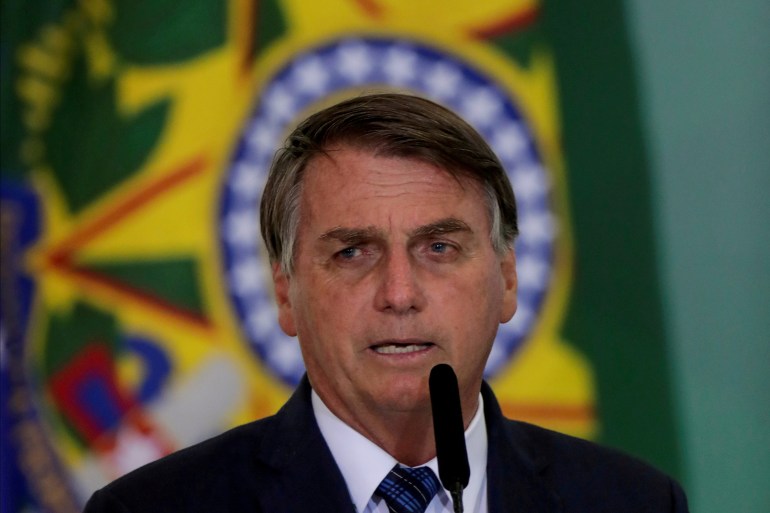Brazil in talks with US to import extra COVID vaccines
South American nation is struggling to contain a nationwide surge in coronavirus infections and deaths.

Brazil is in talks with the United States to import excess COVID-19 vaccines, the Brazilian foreign ministry said on Saturday, as the South American nation struggles to stem rising coronavirus infections and deaths.
The ministry tweeted that, along with Brazil’s embassy in Washington, it has been in discussions with the US government since March 13 “to make it possible for Brazil to import vaccines from the surplus available in the United States”.
Keep reading
list of 3 itemsBrazil records more than 90,000 new COVID cases in a single day
Existing COVID vaccines may protect against Brazil strain: Study
The announcement comes after US President Joe Biden’s administration said on Thursday it would “loan” 2.5 million doses of AstraZeneca’s COVID-19 vaccine to Mexico and 1.5 million other doses to Canada amid a surplus in doses.
Brazilian President Jair Bolsonaro’s government is facing increased pressure to account for his government’s handling of the COVID-19 pandemic, as well as the slow rollout of vaccines.
The country is experiencing a surge in coronavirus infections and deaths, as more than 290,000 people have died since the start of the pandemic – the second-highest tally in the world after the US.
More than 11.8 million cases of COVID-19 have been reported in Brazil to date, according to Johns Hopkins University data.
Since March 13, the Brazilian Government, through Itamaraty and the Embassy in Washington, in coordination with the Ministry of Health, has been negotiating with the US Government to make it possible for Brazil to import vaccines from the surplus available in the United States.
— Itamaraty Brazil 🇧🇷 (@Itamaraty_EN) March 20, 2021
On Saturday, the health ministry said 79,069 new cases were reported in the previous 24-hour period, along with 2,438 additional coronavirus-related deaths.
The country’s healthcare network also is near collapse in several parts of the country, as local and state officials have tried in recent weeks to impose tighter restrictions in an effort to stem the spread of the virus.
The beaches in Rio de Janeiro were closed to the public at the weekend, with Mayor Eduardo Paes urging residents to stay home amid what he described as a “very difficult” situation.
“Either we are aware of it and we respect lives, or we are going to live in an unmanageable situation in the next few days,” he added, as police officers took up positions in front of the beaches of Copacabana, Ipanema and Barra de Tijuca.
It was the first time Rio’s beaches closed to the public since they reopened in July last year.
Sao Paulo state Governor Joao Doria earlier this month also imposed a two-week, “code red” lockdown, shuttering non-essential businesses and restricting other services.
The measures have drawn some protests across Brazil, while law enforcement authorities have broken up large gatherings that violated the restrictions.
Al Jazeera’s Daniel Schweimler, reporting from Buenos Aires, said on Saturday that a problem is that there have been conflicting statements and measures from political leaders across Brazil.
While the mayor of Rio de Janeiro closed the beaches, Schweimler said that Bolsonaro has encouraged people to go “to soak up as much vitamin D and sunshine as they possibly can because he says that is the best way to fight the coronavirus”.
“So you’ve really got this big political problem: those who are imposing measures to try to fight the pandemic, and the president and his allies saying they’re doing a good job, they’re dealing with it as best they can, it’s not their fault and really urging people to go about business as usual,” Schweimler reported.
Bolsonaro, a COVID-19 sceptic who has eschewed public health measures and downplayed the threat of the coronavirus, has asked Brazil’s Supreme Court to overturn the lockdown orders, local media reported on Friday.
“They are imposing a state of siege, which is unconstitutional. They cannot do this without the approval of Congress. They are humiliating the population while saying that they are saving lives. How can they be saving lives, they’re starving people,” Bolsonaro said.

The far-right president last week named Brazil’s fourth health minister since the pandemic started, as he said the country was entering a “more aggressive” phase in the fight against the virus.
Marcelo Queiroga, a cardiologist, has pledged to carry out Bolsonaro’s policies.
Meanwhile, the Brazilian government has struggled to administer COVID-19 vaccines, issuing at least one dose to about 5.4 percent of the population so far.
Brazil in January approved two vaccines for emergency use: the UK’s AstraZeneca and the Chinese-developed CoronaVac.
The country said last week that it had ordered 100 million doses of the Pfizer-BioNTech vaccine and 38 million from Johnson & Johnson, while it is negotiating for 13 million doses of Moderna Inc’s vaccine.